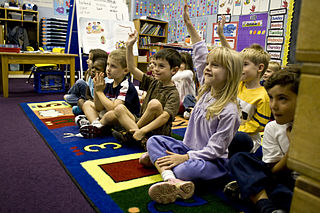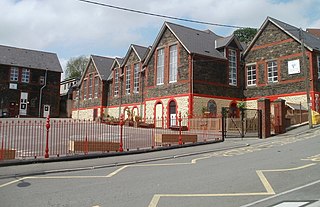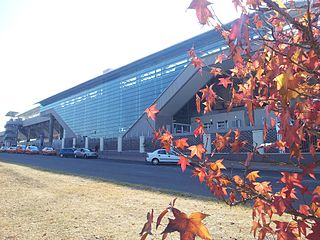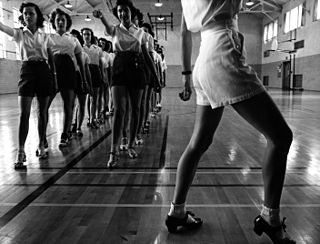
Outcome-based education or outcomes-based education (OBE) is an educational theory that bases each part of an educational system around goals (outcomes). By the end of the educational experience, each student should have achieved the goal. There is no single specified style of teaching or assessment in OBE; instead, classes, opportunities, and assessments should all help students achieve the specified outcomes. The role of the faculty adapts into instructor, trainer, facilitator, and/or mentor based on the outcomes targeted.
The philosophy of education is the branch of applied philosophy that investigates the nature of education as well as its aims and problems. It also examines the concepts and presuppositions of education theories. It is an interdisciplinary field that draws inspiration from various disciplines both within and outside philosophy, like ethics, political philosophy, psychology, and sociology. Many of its theories focus specifically on education in schools but it also encompasses other forms of education. Its theories are often divided into descriptive theories, which provide a value-neutral description of what education is, and normative theories, which investigate how education should be practiced.

A primary school, elementary school, or grade school is a school for primary education of children who are 4 to 10 years of age. Primary schooling follows preschool and precedes secondary schooling.

Kindergarten is a preschool educational approach based on playing, singing, practical activities such as drawing, and social interaction as part of the transition from home to school. Such institutions were originally made in the late 18th century in Germany, Bavaria and Alsace to serve children whose parents both worked outside home. The term was coined by German pedagogue Friedrich Fröbel, whose approach globally influenced early-years education. Today, the term is used in many countries to describe a variety of educational institutions and learning spaces for children ranging from two to six years of age, based on a variety of teaching methods.

In contemporary education, mathematics education—known in Europe as the didactics or pedagogy of mathematics—is the practice of teaching, learning, and carrying out scholarly research into the transfer of mathematical knowledge.

Pedagogy, most commonly understood as the approach to teaching, is the theory and practice of learning, and how this process influences, and is influenced by, the social, political, and psychological development of learners. Pedagogy, taken as an academic discipline, is the study of how knowledge and skills are imparted in an educational context, and it considers the interactions that take place during learning. Both the theory and practice of pedagogy vary greatly as they reflect different social, political, and cultural contexts.

A preschool, also known as nursery school, pre-primary school, play school or creche, is an educational establishment or learning space offering early childhood education to children before they begin compulsory education at primary school. It may be publicly or privately operated, and may be subsidized from public funds. The typical age range for preschool in most countries is from 2 to 6 years.

An infant school is a term which is used predominantly in England and Wales. It has been used since the 19th century to refer to schools or school departments that cater for children up to seven years old.
The Reggio Emilia approach is an educational philosophy and pedagogy focused on preschool and primary education. This approach is a student-centered and constructivist self-guided curriculum that uses self-directed, experiential learning in relationship-driven environments. The programme is based on the principles of respect, responsibility and community through exploration, discovery and play.

Centurion is an area with 236,580 inhabitants in the Gauteng Province of South Africa, between Pretoria and Midrand. Formerly an independent municipality, with its own town council, it has been part of the City of Tshwane Metropolitan Municipality since 2000. Its heart is at the intersection of the N1 and N14 freeways. The R21 freeway also passes through the eastern part of Centurion.
Philosophy for Children, sometimes abbreviated to P4C, is a movement that aims to teach reasoning and argumentative skills to children. There are also related methods sometimes called "Philosophy for Young People" or "Philosophy for Kids". Often the hope is that this will be a key influential move towards a more democratic form of democracy. However, there is also a long tradition within higher education of developing alternative methods for teaching philosophy both in schools and colleges.

Music education is a field of practice in which educators are trained for careers as elementary or secondary music teachers, school or music conservatory ensemble directors. Music education is also a research area in which scholars do original research on ways of teaching and learning music. Music education scholars publish their findings in peer-reviewed journals, and teach undergraduate and graduate education students at university education or music schools, who are training to become music teachers.

Michael Mount Waldorf School is one of 18 registered schools in Southern Africa that practice Waldorf education.
Inquiry-based learning is a form of active learning that starts by posing questions, problems or scenarios. It contrasts with traditional education, which generally relies on the teacher presenting facts and their knowledge about the subject. Inquiry-based learning is often assisted by a facilitator rather than a lecturer. Inquirers will identify and research issues and questions to develop knowledge or solutions. Inquiry-based learning includes problem-based learning, and is generally used in small-scale investigations and projects, as well as research. The inquiry-based instruction is principally very closely related to the development and practice of thinking and problem-solving skills.
One Planet International School is an international school located in Addis Ababa, Ethiopia. At the kindergarten level, it offers Lower Kindergarten, Upper Kindergarten, and Preparatory. At the primary level, grades one through eight are offered. At the secondary level, grades nine through twelve are offered.

Primary education or elementary education is typically the first stage of formal education, coming after preschool/kindergarten and before secondary school. Primary education takes place in primary schools, elementary schools, or first schools and middle schools, depending on the location. Hence, in the United Kingdom and some other countries, the term primary is used instead of elementary.

Dance education is a practice whereby students are taught a broad understanding of dance as a form of art and who are trained professionally in many different genres of dance. Dance education consists of specialized dancers who conduct original research for teaching others how to dance. Currently, dance itself is considered an allied form of art and music, thus dance in formal education is closely knit with these disciplines.
Philosophy education is the practice of teaching and learning philosophy along with the associated scholarly research. It is not philosophy of education, nor the philosophical study of education in general.

Education Scotland is an executive agency of the Scottish Government, tasked with improving the quality of the country's education system. Education Scotland is responsible for inspecting Scotland's state–funded primary and secondary schools, as well as nursery schools which form part of a primary school. Education Scotland and Scotland's Care Inspectorate may collaborate in joint–inspection processes of nursery schools, with work commencing in 2023 for the establishment of a joint inspection framework by both bodies.
Oxford Montessori Schools is a group of progressive, co-educational private schools based in and around Oxford, England. Founded in 1990, the Oxford Montessori Schools group is the largest Montessori organisation in Oxfordshire. The group consists of three schools:












